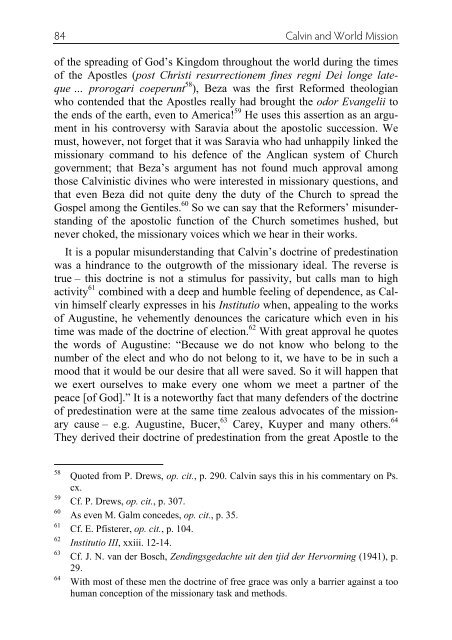Calvin and Missions - World Evangelical Alliance
Calvin and Missions - World Evangelical Alliance
Calvin and Missions - World Evangelical Alliance
Create successful ePaper yourself
Turn your PDF publications into a flip-book with our unique Google optimized e-Paper software.
84 <strong>Calvin</strong> <strong>and</strong> <strong>World</strong> Mission<br />
of the spreading of God’s Kingdom throughout the world during the times<br />
of the Apostles (post Christi resurrectionem fines regni Dei longe lateque<br />
… prorogari coeperunt 58 ), Beza was the first Reformed theologian<br />
who contended that the Apostles really had brought the odor Evangelii to<br />
the ends of the earth, even to America! 59 He uses this assertion as an argument<br />
in his controversy with Saravia about the apostolic succession. We<br />
must, however, not forget that it was Saravia who had unhappily linked the<br />
missionary comm<strong>and</strong> to his defence of the Anglican system of Church<br />
government; that Beza’s argument has not found much approval among<br />
those <strong>Calvin</strong>istic divines who were interested in missionary questions, <strong>and</strong><br />
that even Beza did not quite deny the duty of the Church to spread the<br />
Gospel among the Gentiles. 60 So we can say that the Reformers’ misunderst<strong>and</strong>ing<br />
of the apostolic function of the Church sometimes hushed, but<br />
never choked, the missionary voices which we hear in their works.<br />
It is a popular misunderst<strong>and</strong>ing that <strong>Calvin</strong>’s doctrine of predestination<br />
was a hindrance to the outgrowth of the missionary ideal. The reverse is<br />
true – this doctrine is not a stimulus for passivity, but calls man to high<br />
activity 61 combined with a deep <strong>and</strong> humble feeling of dependence, as <strong>Calvin</strong><br />
himself clearly expresses in his Institutio when, appealing to the works<br />
of Augustine, he vehemently denounces the caricature which even in his<br />
time was made of the doctrine of election. 62 With great approval he quotes<br />
the words of Augustine: “Because we do not know who belong to the<br />
number of the elect <strong>and</strong> who do not belong to it, we have to be in such a<br />
mood that it would be our desire that all were saved. So it will happen that<br />
we exert ourselves to make every one whom we meet a partner of the<br />
peace [of God].” It is a noteworthy fact that many defenders of the doctrine<br />
of predestination were at the same time zealous advocates of the missionary<br />
cause – e.g. Augustine, Bucer, 63 Carey, Kuyper <strong>and</strong> many others. 64<br />
They derived their doctrine of predestination from the great Apostle to the<br />
58<br />
Quoted from P. Drews, op. cit., p. 290. <strong>Calvin</strong> says this in his commentary on Ps.<br />
cx.<br />
59<br />
Cf. P. Drews, op. cit., p. 307.<br />
60<br />
As even M. Galm concedes, op. cit., p. 35.<br />
61<br />
Cf. E. Pfisterer, op. cit., p. 104.<br />
62<br />
Institutio III, xxiii. 12-14.<br />
63<br />
Cf. J. N. van der Bosch, Zendingsgedachte uit den tjid der Hervorming (1941), p.<br />
29.<br />
64<br />
With most of these men the doctrine of free grace was only a barrier against a too<br />
human conception of the missionary task <strong>and</strong> methods.

















